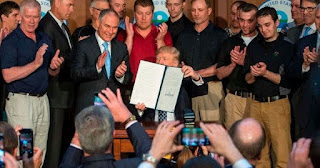Jag har varit i Antarktis och därför betyder dåliga klimatnyheter från polarområdena något speciellt för mig. För många år sedan deltog jag i en europeisk forskningsexpedition till Wedellhavet för att där studera marina mikroorganismer i isen. På vägen dit korsade vi “the roaring forties” för att sedan färdas runt bland isen under nära två månader. Jag har sett mängder av isberg, stått ovanpå isberg och på isflak med många tusen meter vatten under mina fötter. Jag har sett Adeliepingviner vandra i led över isen och beundrat kejsarpingviner på nära håll. Bilden jag bär med mig av Antarktis är en kritvit ispetrell mot den klarblå himlen.
Jag har inte bara varit i Antarktis, jag har också bott i Umeå som ligger längre norrut (latitud 64N) än vad vi nådde söderut ombord på Polarstern. I det subarktiska klimatet i norra Sverige var det i början av 80-talet inte ovanligt med veckor i sträck med kallare än -20°C varje dag. Jag har också arbetat med marin forskning i Bottniska viken, när det fortfarande regelmässigt var 1 m solid is i april. Så är det inte längre, även i Arktis stiger temperaturen rasande snabbt.
Tillbaka till Larsen C. Betyder just denna händelse en omedelbar katastrof? Nej, eftersom shelfisen flyter på vattnet betyder det inte att havet stiger, men det är en varningssignal. Vi har redan höjt temperaturen med drygt 1°C genom våra utsläpp. Thwaites är en glaciärer i västra Antarktis som beräknas bli instabil om shelfisen försvinner. Hur fort en kollaps av Thwaites skulle kunna ske vet vi inte, bara att följderna vore dramatiska. Smälter Västantarktis stiger havet 6-8 m, till den nivå havet hade under Pliocen-epoken för 3 mijoner år sedan. Oroväckande nog var CO2-halten i atmosfären då densamma som vi med våra utsläpp har nått idag.
Om vi inte ändrar kurs går vi en het och blöt framtid till mötes. Läget är illa nog utan att ta till de minsta överdrifter och vI behöver samla kraft för att orka handla. Därför väljer jag att trots min dystopi att försöka hitta skäl till optimism, för samtidigt med larmrapporterna händer också mycket positivt. Omställningen från kol och olja till förnyelsebar energi från sol och vind pågår för fullt. Vad än Trump säger är kolets tid snart förbi. Kombinationen av allt billigare elektricitet och elektrifiering av våra bilar är ett exempel på disruptiv utveckling. Att kinesiskt-ägda Volvo satsar på elbilsutveckling ger hopp om att även Göteborg skall kunna bryta upp från beroendet av fossilindustrin.
Det finns också en allt större medvetenhet om behovet av hållbar utveckling bland både företag, folkrörelser och “folk i allmänhet”. Hundratals seminarier om hållbarhet hörs under årets politikervecka i Almedalen. Människor är allt mer medvetna om klimatförändringen och många vill göra något. Som Svante Axelsson utrycker det, fossilfritt ligger i tiden!
Men som dystopisk optimist måste jag också peka på riskerna. Det går inte att vara “dumoptimist” och tro att enbart goda marknadskrafter och “grön tillväxt” skall lösa problemet. Vi är på G, men det går alldeles för sakta. Det saknas dessutom insikt om att den nödvändiga omställningen blir just det, en omställning av vårt sätt att leva:
For more than two decades, many people tried to sell climate action
by arguing that it wouldn’t really demand much change, at all
Så glöm bort att vi kan fortsätta med Thailandsresor och obegränsade shoppingresor till London och Paris. Att flyg är en stor klimatbov vet vi redan och det visas tydligt i en ny studie från Lunds Universitet (Att vi i den rika delen av världen inte bör skaffa onödigt många barn var också en slutsats). Flygresor är både en reell riskfaktor för klimatet och en symbol för om vi är beredda att ändra beteende. Utan att försaka något av vår bekvämlighet och vår “rätt” att flyga till solen varje år kommer vi inte att klara klimatet.
Självklart räcker det inte med att vi agerar enskilt. Dessutom skiljer det sig mycket mellan individer när det gäller vilka utsläpp man är med och skapar. Till stor del handlar det om pengar, har man mer ekonomiska resurser tär man mycket mer på våra resurser och vårt klimat. Det gäller i en stad som Göteborg och det gäller globalt, där den rikaste tiondelen står för hälften av utsläppen. Därför måste en långsiktigt hållbar klimatpolitik även hantera ojämlikhet inom och mellan länder.
Men det spelar roll vad vi gör och effekten ökar snabbt om vi är många som gör det. Vi kan sätta exempel som individer, påverka inom våra företag och organisationer och ingjuta mod i vankelmodiga politiker så att de vågar visa ledarskap. Vi har fortfarande möjligheterna - om vi har viljan och utmanar vi både vår egen bekvämlighet och trögheten i den politiska sfären. Och att vi kan lämna tron på den eviga tillväxten som enda rättesnöre för våra samhällen. Mer på det temat följer!























